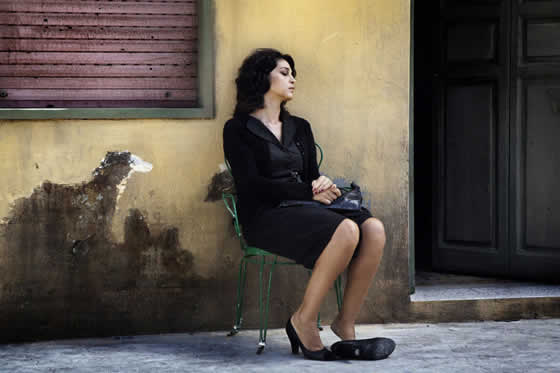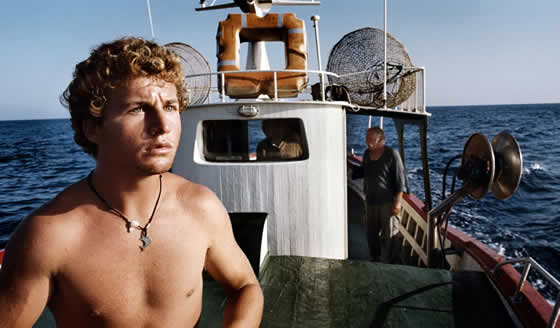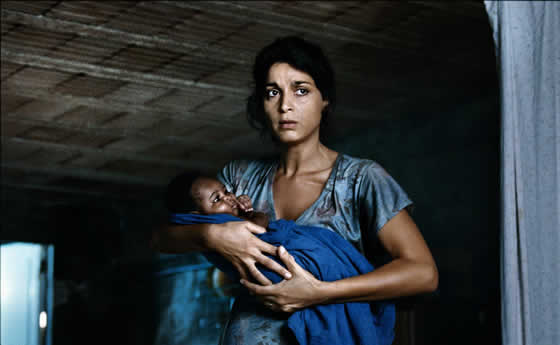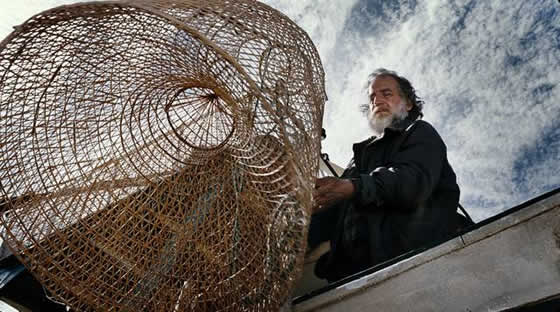 Terraferma happens on a tiny, remote Sicilian island, where a local woman and an immigrant find themselves at odds with each other and yet are united by the same dream: a better future for their children, their very own Terraferma.
Terraferma happens on a tiny, remote Sicilian island, where a local woman and an immigrant find themselves at odds with each other and yet are united by the same dream: a better future for their children, their very own Terraferma.
Terraferma is not only a navigator’s point of arrival; it is also an island with deeply rooted traditions which appear to have stopped in time. And it is the issue of time standing still that is creating upheaval in the Pucillo family. Ernesto is 70 years old; he hates change and doesn’t want his fishing boat to be scrapped. His grandson Filippo, whose father was lost at sea, is 20 years old and juggles his existence between his grandfather Ernesto’s timeless subsistence and his uncle Nino’s way of life, in which catching fish has been replaced by catering to tourists. His young, widowed mother, Giulietta, believes that the island’s unchanging lifestyle has turned them all into outsiders and that neither she nor Filippo stand a chance of forging a different future. The hope of doing something different with their lives means finding the courage to leave. One day the sea carries other voyagers into their lives: among them Sara and her son, who have escaped violent oppression in North Africa.
Ernesto, firmly entrenched in the traditional laws of the sea, is very welcoming to all who have traveled over water. However, man’s laws seem to have changed and favor an entirely different approach to dealing with illegal immigrants. This dilemma creates a great deal of turmoil in the Pucillo family, especially between Giulietta and Sara, and the Pucillo’s have no choice but to reexamine their way of life.
Terraferma, directed by Emanuele Crialese won HP’s Bridging The Borders Award, offered by Cinema Without Borders and sponsored by HP at 2012 Palm Springs International Film Festival.
Bijan Tehrani: How did you come up with the idea for Terraferma?
Emanuele Crialese: There wasn’t a specific moment; I had this idea in mind and knew I wanted to make a film about the immigration process, especially about what has been going on in Italy in the past few years. Immigration laws in Italy are very confusing, and from my point of view they are also uncivilized. Italians have dealt with immigration throughout history, and every Italian family has at least one member that lives abroad, but in the past three years the Italians have blocked their memories about this idea—the idea that people could leave their country and try to find a better life in a foreign land. The story just came to me and I did not have to look for it. I was constantly getting messages about what was happening in regards to immigrant issues in the political scene and, little by little, I started to write the script. It was a process that took over a year, and finally I decided to go ahead and make it into a movie. The main character was probably the last piece of proof that inspired me to tell the story of Terraferma.
BT: How did your co-writer contribute to your story and help make it into a screenplay?
EC: For this movie, I wanted to have a partner for creating the concept of the film. I wanted the film to present a realistic point of view. My fear was that if I create everything, I would over-judge the situation and may take sides. I did not want to make an ideological film; I wanted to make a universal, human-related film. I knew that the theme of immigration is one of the most important themes of the century, and it’s not limited to the 21st century, and I really wanted to make sure that I was not too political or ideological about it. I picked Mulroney as my co-writer because he has written material similar to Terraferma, and I wanted him to come with me on this adventure.
 BT: This is not a film about politics, but yet politics force themselves into the film—similar to how they do in our daily lives. How did you succeed in keeping the politics present, but not overstated?
BT: This is not a film about politics, but yet politics force themselves into the film—similar to how they do in our daily lives. How did you succeed in keeping the politics present, but not overstated?
EC: Every film I make, I try to see things that are human related: What is human about the story? What can be told in any part of the world? I can get away pretty easily with the aspect of politics because human films are almost always about politics. With this film, I didn’t want to get inside the psychology of my characters, but I wanted to have a distant look of the politics—almost as if I was telling the story to a child. When we are telling a story like this one, we ask ourselves, “What are the basic human issues that we are facing?” I like to transcend reality to provide a different point-of-view. That is why documentary style does not suit my films, because there is nothing farther from reality than what we try to manipulate on TV.
BT: There is something beautiful in this film that reminds me of old Rossellini movies.
EC: That is a part of me! When you grow up and your first readings are Westerns—those films were food for me and I have digested those films. Now I am showing to the audience what I have been eating for my entire life, in terms of cinema of course.
BT: How did you come up with the visual style of the film and how did you work with the Director of Photography of the film?
EC: Fabio is a very extraordinary artist! For the first time, I felt that I had someone close to me who did not need everything to be clarified and was able to improvise and even change things as they were occurring. It gave me a lot of freedom and we were very pictorial. When we did our interior, I told him to think of collages, and the look is great. Even with our characters: he gave dignity to modern people. In casting, I wanted to get real faces and real people. Fabio would not ask me to banish them and he understood that they have to be submerged in the real and unreal atmosphere. Combined with the choice of the landscape around the characters, Fabio really melted the light and the use of the landscape.
BT: I think that the scenery and lighting are like characters in your film.
EC: Yes, I try to do that. Sometimes things don’t come out the way you want them to, but I am obsessed with that visual aspect of the film.
BT: Please tell us about your experience working with Fillipo Pucillo.
EC: We first met when he was nine year old and he stopped going to school when he was 13 because they could not keep him in class. When we saw him, he had a tool like something out of ‘David and Goliath” and I was fascinated by this kid. When he became an actor, the first film he saw in the big screen was his own movie because, on the Island, we do not have movie theatre. For me, it was like filming a very smart animal. He has no image of himself and he is incapable of judging himself. He knew how to play and to judge the camera, and this is what makes his performance so special; because he is so instinctual. He gave names to things on the set—he named the camera “Dinosaur”—so that gives you an idea of what his perception of filmmaking is.
BT: Another amazing performance in the film is from Donatella Finocchiaro. Is this the first time that you have worked together?
EC: This is the first time that we have worked together. I have watched her and have followed her performances, and she is a rare find in Italy: a strong female character. Donatella was my woman because she is down-to-earth and she is not a diva. She works with her hands and she can even cook for everyone.
BT: How has the Italian reaction been to the film?
EC: Audiences liked it to the highest level that they could welcome a film like this. Terraferma is a film with no major star. People forget and ignore the issues that they do not like and audience does not want to see this aspect of human life. They know these things happen, but they don’t want to accept it. Still, the audiences liked it. Of course it was not a blockbuster like an American picture. To have a big success in Italy, you have to have a comedy with women and bare boobs, or you need an American action movie—so this film was difficult for market, but we got the best-possible results out of it.
BT: How do you feel about winning HP’s Bridging The Borders Award, presented by Cinema Without Borders, at the Palm Springs International Film Festival?
EC: I can’t start to tell you how honored I am and how sorry am that I wasn’t able to be among you that night. Ultimately, it’s the work that counts and I admire you for your courage to shed some light on a story too-often hidden by society. It is with my warmest regards that I thank you, Cinema Without Borders, HP, and all of your jury members for the recognition you are giving Terraferma.
BT: You deserve it! Do you have any new projects lined up?
EC: Right now I have three projects lying on my desk! I have to rework them, so I am in the early phases. I’m not sure which one will be my next story because a film can become a many-year process, and it is like a relationship. I should be on a clear path in a couple of months.
BT: We are looking forward to it; good luck to you!

